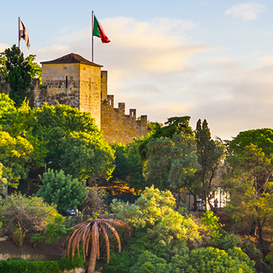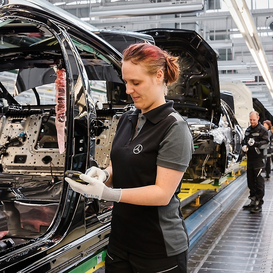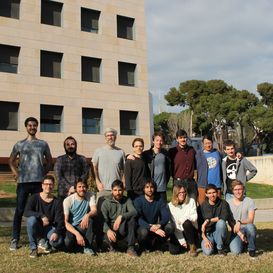Focus on Portugal
ANI – a new generation framework to drive Portugal into the future
Portugal's progress over the past decade in the international innovation rankings shows the effort of public and private investment in science, R&D and innovation activities. Today Portugal has excellent scientific and technological infrastructures worldwide, a favourable framework for technology-based entrepreneurship with a strong connection to the scientific and higher education system, as well as companies and startups that compete globally. A new generation National Innovation Agency ANI (Agência Nacional de Inovação) supports technological and business innovation in Portugal, contributes to consolidating the National Innovation System (NIS) and strengthens the competitiveness of the national economy in global markets.
Committed to R&D and innovation
With Portugal about to assume the Chairmanship of Eureka this summer, Rita Silva, Senior Innovation and Entrepreneurship Consultant at ANI, is joined by Miguel Bello (CEO) and Emir Sirage (COO) of the Atlantic International Research Centre (AIR Centre), an international collaborative framework to address global challenges and local priorities in the Atlantic Ocean. Here they consider the current state of the software industry and innovation landscape in Portugal along with its ambitions in this area and its drive to help position Portugal in the group of highly innovative European Union countries by the beginning of the next decade. “When we look at the main ICT industrial cluster in Portugal,” Rita begins, “the fact that the sector mobilises the highest rate of private investment, with almost 1000 million euros of private investment on R&D, is a clear statement of ambition for this sector that is dominated by SMEs (only 0.3% are large enterprises). As far as public support to R&D in ICT is concerned,” she continues, “in the period between 2014 to 2020, we funded 420 R&D projects involving a little over 555 million euros of investment, corresponding to 319 million euros of public support. This accounts for 34% of the overall public support to R&D and innovation in Portugal.” However, while Portugal performs below the EU average in terms of human capital, the improvement in the basic level of digital skills and a greater proportion of ICT graduates is evidence of a growing impact and progress in the ICT industry.
ePortugal
Of course, in the advent of the Coronavirus pandemic and the need to support the economic recovery, Portugal has taken a large number of initiatives to minimise contagion and to support the health system as well as accelerate and reinforce digital service infrastructures to deal with higher demand. “Like rapidly digitising the public administration mainly through the ePortugal portal and offering new services like online registration of births,” Rita explains. “For the economy, digital platforms were set up in order to support SMEs that have stayed open during the crisis and several initiatives have provided support to digital home schooling, with national and regional tele-school channels created mainly to support students without internet access or equipment.”
Addressing digital skills
Looking further ahead, post COVID-19 crisis, Portugal is advanced in the deployment of Very High Capacity Network (VHCN) and is above EU average in the provision of digital public services, although it lags behind in assigning the radio spectrum for 5G and needs to tackle its weak performance in the digital skills indicators. “But,” Rita says, “we are implementing the national initiative on digital competences (INCoDe.2030) as well as launching the second phase of the Industria 4.0 national strategy for the digitisation of the economy, dedicating 600 million euros in total funding over the next two years. In addition, two relevant strategies on Artificial Intelligence (AI) and Advanced Computing have been launched with a strong focus on improving advanced digital skills. In our pursuit of a National Strategy for the Digitisation of the Economy, we have recently established Portugal Digital to address and overcome the challenges in the digital transition in Portugal.”
Portugal Digital
Portugal Digital is founded on three pillars: i) training and digital inclusion of people, ii) digital transformation of the industrial sector, and iii) digitalisation of the public administration. The general digital transition strategy for industry called ‘Industry 4.0 Programme’ (i4.0) that was established in 2017 has three main goals: to accelerate the adoption of i4.0 by the Portuguese business fabric, to promote Portuguese technological suppliers as i4.0 players, and to make Portugal an attractive hub for i4.0 investment. The implementation and monitoring of the strategy is overseen by COTEC Portugal, a Portuguese business association for innovation, as well as by its Strategic Committee composed of representatives of both the public sector and the private sectors, who finance the programme.
Transformation
“Initially, the focus was on mobilisation and raising awareness,” Rita explains. “The second phase of the programme, launched in April 2019, has ambitious transformative goals and aims at placing Portugal in the leading group of countries driving the digitalisation of European industry. Currently, there are four Digital Innovation Hubs, two in the North focusing on manufacturing, one in Coimbra targeting the health sector and one in Lisbon specialised in the agricultural sector.” Furthermore, Portugal is also finalising its National Strategy for AI, which has already been presented and discussed with AI companies, the research community, uptakers and public administration. AI is one of the main priorities for future investment. All in all, overall investment in areas connected with digitalisation are expected to surpass 918 million euros.
Software opportunities
Rita continues: "More specifically in terms of software and software innovation, Portugal's national priorities lie in the areas of artificial intelligence, advanced computing, 5G and cyberspace security. The Portuguese Association of Software, Assoft, believes great opportunities exist for Portuguese software companies if they can overcome a number of challenges. Firstly, technological. The growing use of mobile solutions, cloud computing, big data, the internet of things, Artificial Intelligence, Blockchain and crypto coins – these are some of the key trends that require the redesign and rewriting of applications currently in production. Secondly, human resources. Given the “brain drain” phenomena of ICT graduates in Portuguese universities to foreign markets, resulting in the scarcity of qualified people for the needs of the market which is witnessing a growing penetration of multinational and outsourcing companies.
Emir Sirage adds: “Actually, in Portugal we have three unicorns (companies whose value exceeds 1 billion US dollars) that are Portuguese founded and a good number of other highvalue companies that have good international exposure. Their centres of competence – or the brains of these companies – are still based in Portugal, which pays tribute to the quality of the engineering in the various institutes and institutions we have here.”
Strong innovator
Assoft is working hard to conclude cooperation protocols with government authorities and other foreign associations - namely in Angola, Chile, the UK and the USA - and with several European government organisations and NGOs. “And, of course,” Rita adds, “ANI is supporting technological and business innovation in Portugal and strengthening the competitiveness of the national economy in global markets. We pursue policies and initiatives to promote private investment in R&D, collaboration between R&D entities and enterprises for an effective transfer of knowledge to the market as well as promote the internationalisation of Portuguese innovative companies and R&D institutions through supporting participation in Horizon 2020 (future Horizon Europe), hosting part of Horizon Europe’s NCPs network, as well as other international networks such as Eureka. For the first time, Portugal has joined the group of Europe’s ‘strong innovators’, showing the best performance improvement in relation to the other members states, with an increase of 21.5%. In addition, Portugal, for the second consecutive year, leads the category ‘innovation in small and mediumsized enterprises (SMEs)’,” Rita says proudly. ANI has also launched a Call for the classification of entities as Digital Innovation Hubs as part of the Portugal’s Action Plan for Digital Transition. The aim is to create a National Network of Digital Innovation Hubs that allows for the growth and faster digital transition of companies, particularly SMEs, and Public Administration.
Platform for the Eureka Chairmanship
A good platform when taking up the Chairmanship of Eureka in the summer, an event that Miguel Bello is looking forward to. “In our last Eureka presidency, in 2008, we championed the expansion of Eureka Clusters so we were pleased to see South Korea join a year later and more, such as Canada and South Africa, since. We believe that expanding the outreach will bring great benefits, and this will be one of our lines in our forthcoming Chairmanship. We will be taking up this role during COVID-19 and will be leaving, in all probability, post-COVID-19. One of our priorities will be to foster innovation through international collaboration to meet the challenges, where areas like Earth Observation from Space are a technological enabler to tackle climate change, ocean sustainability, health and energy that have been pushed into the background by the pandemic. So our motto is ‘innovation for a greener, digital and healthier planet through a collaborative approach’. During our Chairmanship we will also be overseeing the implementation of the new Eureka governance model related to the revitalisation of the Eureka Clusters. So we have lots to do, and we’re looking forward to the challenge.”
Business incentives
There are a good few incentives for Portuguese businesses to get involved in the Eureka Clusters, such as the SIFIDE tax incentive system and grant-based incentives for industrial codevelopment R&D projects led by companies in collaboration with R&D institutions or so-called Mobiliser programmes in which strategic R&D projects involve industry clusters and impact its value chain with the creation of new products, processes or services with a high technological and innovative content. In addition, the Interface Programme is geared to strengthening knowledge transfer between academia/R&D entities and businesses.
Promoting internationalisation
“Together with CELTIC-NEXT, ITEA 3 provides an excellent channel for the internationalisation of our companies and research centres. In fact, these two Eureka Clusters have the largest Portuguese participation,” Rita points out. “The opportunity also to collaborate beyond Europe, on a truly global stage, is one of the major benefits. The recent growth of the ITEA Community, with countries as far and wide as Turkey, Canada, South Korea, South Africa and Chile, provides a real incentive and complements our own efforts to promote internationalisation, as I said earlier.” In terms of funding and participation in ITEA projects, 14 projects have been financed by the Portugal 2020 Notices (since 2017), with a total eligible investment of around 9.5 million euros and a total incentive of 5.9 million euros.
The Portuguese entities most represented in ITEA include Evoleo Technologies, SISTRADE Software Consulting, S.A., Instituto Superior de Engenharia do Porto (ISEP), University of Porto, Polytechnic Institute of Porto and Instituto de Telecomunicações.
Game-changing, high-tech innovations
“The collaborative environment provided in such networks as ITEA has helped Portugal become the nest for some high-tech innovations that have changed the world we live in today. For example, the Multibanco network, one of the more sophisticated banking networks in the world; Via Verde, the first closed system of automatic highway tolls in the world; and the Pre-Paid Mobile Phones, which quickly became the foundation for the mobile revolution we have today. Portugal is also one of the European countries with the highest FTTH penetration, 46% of all households, and has been in the forefront of the 3G and 4G infrastructure investment.” In this context, Portugal is not only a market open to innovation, but also the best gateway to ICT companies in the Lusophone markets (where Portuguese is spoken). Ready for the next phase along with the forthcoming Eureka Chairmanship.
More information
https://www.ani.pt/en/international-promotion/global-network/eureka-eurostars/
Other chapters
Use the arrows to view more chapters

Editorial
By Zeynep Sarılar

Country Focus: Portugal
ANI – a new generation framework to drive Portugal into the future

EVOLEO Technologies
Daring to dream

ITEA Success story: FUSE-IT
Enhanced connectivity and security for building management at lower costs

Viewpoint on mentorship
Mentoring is...

SotA highlight
IoT: where do we stand?

Community Talk with Raúl Santos de la Cámara
The rewards of being part of a strong Community

End user happiness: MOSIM
Digital human simulation helps manufacturers improve productivity and safety

ITEA Success story: 3DPathology
A digital pathology solution for more effective and efficient treatments

SME in the spotlight: Clevernet
The intelligent way to transfer data

AI Call 2020 ITEA projects
Diverse and promising innovations improving AI

ITEA Cyber Security Day 2021
Understanding and solving cyber security challenges together


